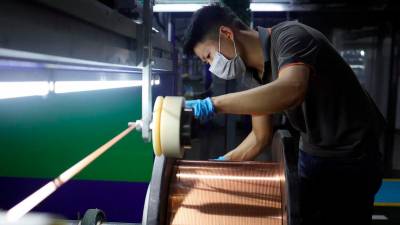GANZHOU: Chinese copper flat wire manufacturer Wellascent Electronic has turned geopolitical risks into competitive advantages through strategic investment in Texas.
The company’s early 2023 decision to build a factory in Grand Prairie now shields American clients from 50% import tariffs on copper wire and semi-finished products.
“A few prospective clients in the United States were hesitating about buying our products at the very beginning, as they were concerned Sino-U.S. trade tensions would make stable supply uncertain,“ board member Hazel Zhu revealed during a factory tour.
The Texas facility will begin production later this year with an annual target of three thousand metric tons by 2028, serving major clients like automaker Stellantis.
“A factory in the U.S. means the copper tariffs have in turn become a golden opportunity for us,“ Zhu added, highlighting the unexpected benefits of trade protectionism.
Wellascent plans to invest one hundred million dollars over three years in the US plant, expecting it to generate more than half of overseas revenue within that period.
This investment represents a rare case where Chinese companies benefit from tariffs designed to counter China’s industrial dominance.
The situation underscores Washington’s ambivalence about welcoming Chinese companies despite achieving stated goals of bringing industry to America.
Lawmakers recently proposed removing tax credits from a Ford electric battery plant over its planned use of technology from Chinese manufacturer CATL.
Some US solar producers have voiced concerns about Chinese rivals setting up domestic factories while benefiting from subsidised supply chains in China.
Chinese manufacturing investments began declining after Trump’s first term and have now stalled completely according to Tidalwave Solutions senior partner Cameron Johnson.
“Anybody who is big and could be a target for U.S. or Chinese governments is doing hardly any investment,“ Johnson observed, noting Wellascent’s unusual position.
US data shows the net stock of Chinese foreign direct investment fell by 8.1 billion dollars between 2019 and 2023.
Zhu confirmed the company faced no regulatory hurdles for its Texas investment, receiving approvals from both Chinese and US authorities.
A temporary 145% tariff on equipment shipments in April nearly derailed plans before a May truce avoided a 60% cost increase.
“The sudden 145% tariff left us completely stunned, as it left us at a crossroad as for whether to reconsider the investment,“ Zhu explained.
Both nations extended their trade truce by ninety days this month to allow more negotiation time for what Trump calls an imminent deal.
Johnson suggested successful companies like Wellascent could become case studies for other Chinese firms if relations improve.
“Their example was pretty unusual, but maybe, if the relationship gets a bit better, we might see more of it because there are test cases out there in the market,“ he concluded. – Reuters
